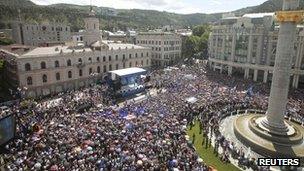Mass opposition rally in Tbilisi, Georgia
- Published

Tens of thousands have thronged the streets of the Georgian capital to attend a political rally organised by a Georgian billionaire and opposition leader.
Bidzina Ivanishvili, one of the country's richest men, is campaigning ahead of October's parliamentary poll.
The protest is the largest anti-government demonstration in years.
President Mikheil Saakashvili's second and last presidential term ends in January 2013.
Although his future plans are unclear, he has not excluded becoming prime minister.
Mr Ivanishvili made his entry into politics last October, announcing that he was forming a political party with the aim of winning the parliamentary vote and assuming the post of prime minister.
He has used his wealth to unite the opposition and fund his election campaign.
Addressing the crowd he said: "The parliamentary elections slated for autumn pose the question 'to be or not to be?' to our country.
"We will win, no doubt, although just wishing is not enough for a victory."
Mr Ivanishvili's supporters accuse President Saakashvili of authoritarianism and say he is not doing enough to tackle poverty and unemployment.
However, many Georgian voters are suspicious of Mr Ivanishvili, who earned his wealth in Russia during the 1990s.
The BBC's Damien McGuinness, in Tiblisi, says the demonstration is being seen as a test of the opposition's public support.
The turn-out - which the opposition claim was as high as 300,000 people - suggests that Mr Saakashvili's ruling party may have more of a fight on its hands than originally expected, our correspondent says.
A year ago, four people were killed after police clashed with violent protesters during another opposition rally.
Before Mr Saakashvili came to office after the Rose Revolution of 2003, Georgia was almost a failed state, with high rates of criminality.
There are fears, our correspondent explains, that a change of leadership would take the country back to that time.
- Published3 October 2012
- Published11 October 2011
- Published23 May 2011
- Published20 January 2011
- Published31 January 2012
- Published31 January 2012